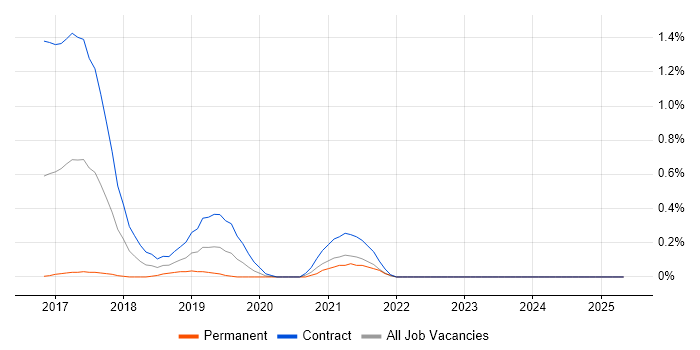JSON Web Token (JWT)
Buckinghamshire > Milton Keynes
The table below provides summary statistics for permanent job vacancies advertised in Milton Keynes requiring JWT skills. It includes a benchmarking guide to the annual salaries offered in vacancies that cited JWT over the 6 months leading up to 27 June 2025, comparing them to the same period in the previous two years.
| 6 months to 27 Jun 2025 |
Same period 2024 | Same period 2023 | |
|---|---|---|---|
| Rank | 34 | - | - |
| Rank change year-on-year | - | - | - |
| Permanent jobs citing JWT | 1 | 0 | 0 |
| As % of all permanent jobs advertised in Milton Keynes | 0.44% | - | - |
| As % of the Libraries, Frameworks & Software Standards category | 3.57% | - | - |
| Number of salaries quoted | 1 | 0 | 0 |
| Median annual salary (50th Percentile) | £48,000 | - | - |
| Buckinghamshire median annual salary | £48,000 | - | - |
All Software Libraries and Frameworks
Milton Keynes
JWT falls under the Software Libraries and Frameworks category. For comparison with the information above, the following table provides summary statistics for all permanent job vacancies requiring technical specification, industry standards, software libraries and framework skills in Milton Keynes.
| Permanent vacancies with a requirement for technical specification, industry standards, software libraries and framework skills | 28 | 170 | 213 |
| As % of all permanent jobs advertised in Milton Keynes | 12.23% | 16.41% | 25.51% |
| Number of salaries quoted | 23 | 143 | 139 |
| 10th Percentile | £44,600 | £37,500 | £44,800 |
| 25th Percentile | £49,625 | £43,750 | £53,125 |
| Median annual salary (50th Percentile) | £60,000 | £54,000 | £65,000 |
| Median % change year-on-year | +11.11% | -16.92% | +18.18% |
| 75th Percentile | £67,875 | £62,500 | £75,000 |
| 90th Percentile | £76,000 | £78,500 | £82,750 |
| Buckinghamshire median annual salary | £53,750 | £52,500 | £62,500 |
| % change year-on-year | +2.38% | -16.00% | +8.70% |
JWT
Job Vacancy Trend in Milton Keynes
Job postings citing JWT as a proportion of all IT jobs advertised in Milton Keynes.

JWT
Co-occurring Skills and Capabilities in Milton Keynes by Category
The follow tables expand on the table above by listing co-occurrences grouped by category. The same employment type, locality and period is covered with up to 20 co-occurrences shown in each of the following categories:
